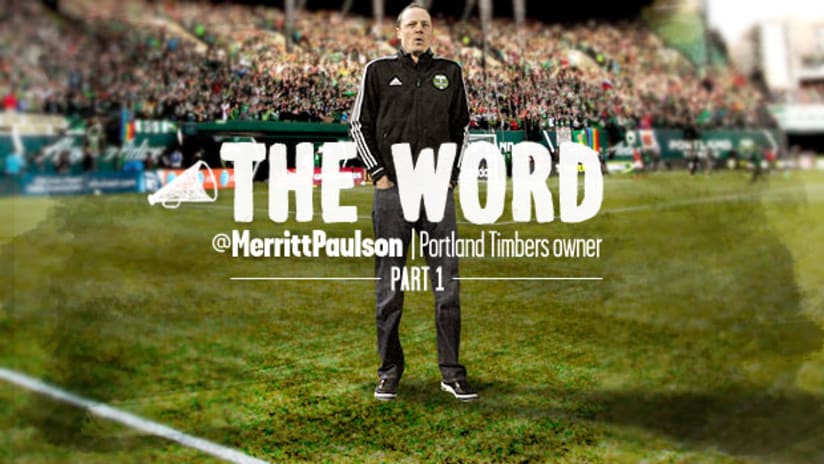"The Word" is MLSsoccer.com's weekly long-form series. In this week's first of a three-part feature, senior editor Nick Firchau examines the sometimes-polarizing popularity of Portland Timbers owner and president Merritt Paulson, who has emerged as one of the most captivating owners in professional sports since he bought the club in 2007 and battled with the Portland city council to help bring Major League Soccer to the Rose City.
Read the second part of the series here, and the third part here.
PORTLAND, Ore. – Merritt Paulson wants to celebrate, and he’s earned it.
It’s the night of April 14, 2011, and the Portland Timbers are less than an hour removed from their first franchise win since joining Major League Soccer. Paulson – the Timbers’ owner and president since 2007 and the driving force behind the team’s graduation from the minor leagues to MLS – is skipping back up to his office on top level of JELD-WEN Field. Three floors down, Timbers players and coaches are rejoicing on a field that was once primarily a baseball diamond, until Paulson came to town and fought tooth and nail with local politicians to turn the city’s downtown stadium into a mecca for North American soccer.
On his way up a side staircase, he stops in his tracks to acknowledge a reporter, one of dozens who covered the team’s long-waited home opener. It’s instantly obvious he has something to say but isn’t quite sure exactly how to say it, or if he even should.
But it’s a proud moment for Paulson, who two days before caught an interview with ESPN analyst Alexi Lalas, in which the former MLS and US national team star predicted the Timbers would not only lose the home opener against the Chicago Fire, but then lose again when FC Dallas came to town just days later.
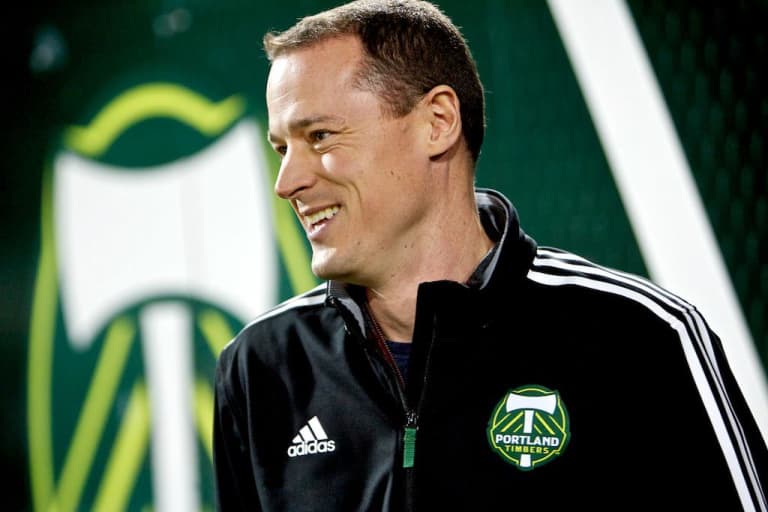
Portland Timbers owner and president Merritt Paulson, during the team's annual preseason tournament in Portland in February.
- Photo courtesy of Craig Mitchelldyer/Portland Timbers
After a second of thought, Paulson stops the reporter and sticks a finger in the air.
“Hey,” he yelps. “What’d you think of that, huh? Make sure you tell Alexi Lalas to go [expletive] himself.”
Behold, both the brilliance and the burden of being Merritt Paulson. He’s proven to be one of the most determined and successful owners in the league in just a few short years on the job, but he’s also emerged as something of a radioactive personality that both fans and MLS officials can’t look away from, in fear they might miss his next move.
When they were informed that Paulson was the subject of this article, for example, high-ranking officials from three different MLS clubs (not the Timbers) all reacted with a wry smile and different variations of the same question: “Is that guy as crazy as he seems?”
The short answer: not quite. Based on numerous on- and off-the-record interviews with MLSsoccer.com since the Timbers made their MLS debut in 2011, Paulson has proven to be everything most Portland fans see week in and week out as the face of their franchise. He’s a savvy businessman with valuable connections inherited in part from a very famous father, a bulldog of a politician who somehow solved Portland’s notoriously stagnant city government, an unflinching and obsessive Timbers fan and a fascinating character who despite being keenly aware of his own flaws, sometimes can’t seem to stay out of his own way.
Since coming to MLS, Paulson has done each of the following things, the first three via his must-follow Twitter feed: called a group of Timbers fans “idiotic” and “moronic,” subtly mocked Seattle Sounders head coach Sigi Schmid’s weight, earned the largest fine in MLS history for blasting referees and, in a Colorado Rapids press box during the Timbers’ first MLS game after learning he had no owners suite to sit in, insisted, "I'll tell you what, when those [expletive] come to our place they're going to be sitting in the stands."
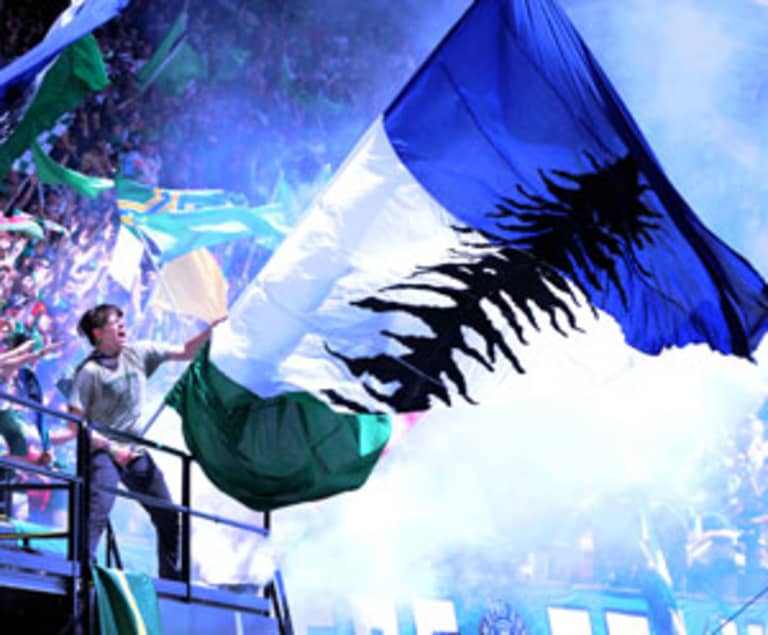
A Timbers fan waves a a flag during the team's match against the Seattle Sounders in July 2011.
- USA Today sports
But Paulson is quick to explain he’s certainly prone to emotional outbursts during or after a Timbers game, and Twitter might not be the best avenue for anyone to express themeselves when they're upset. And if you ask Timbers fans – the die-hard ones, who have known years of absentee owners since the NASL days of the mid-1970s – they embrace Paulson not only for the political slog he endured to bring MLS to town, but also for his unquestionable passion for the team.
Says one: “It’s pretty simple. Without Merritt Paulson, the Timbers wouldn’t exist as we know them today.”
But despite his endearing fanaticism and quirky behavior, the clock is ticking on Paulson and the Timbers. After a dismal 2012 season that fractured the team’s leadership and brought Paulson to the lowest point in his career, the club is in a fight to stay relevant. A sluggish start to 2013 under new head coach Caleb Porter hasn’t brought any new attention their way, and they’re still trailing behind rival regional clubs from both Seattle and Vancouver in MLS success.
If the team continues to struggle this year the way they did last – when Paulson was nearly brought to tears in public by the idea of firing his hand-picked head coach and forced to shelve his very public postseason plans – some people simply won’t care what Merritt Paulson has to say anymore.
---
Merritt Paulson doesn’t like to do this very often. In fact, in the months leading up to the Timbers’ third season in MLS, he began preaching that this year he’ll step back from the spotlight a bit, and let his players and wunderkind head coach become the public darlings of the team.
But the principal at nearby Lincoln High School is a friend, so here’s Paulson, pacing back and forth in front of a core management class in mid-February just blocks away from his office at JELD-WEN Field (right), preaching to a group of teenagers about the benefits of knowing your customer.
At one point in the lesson, Paulson asks the class if anyone has heard of famous English club Manchester United, and there’s a smattering of raised hands, a few innocuous grunts.
“Bueller … Bueller? ” Paulson says with a laugh. “Oh God, I’m dating myself. Has anyone in this class ever even seen that movie?”
Paulson came of age in the 1980s, the same time filmmaker John Hughes’ iconic characters navigated adolescence on the North shore of Chicago. He was raised not far away, on a five-acre farm in the Northwest suburb of Barrington, where his father gradually climbed the ladder in the Chicago office of global investment giant Goldman Sachs.
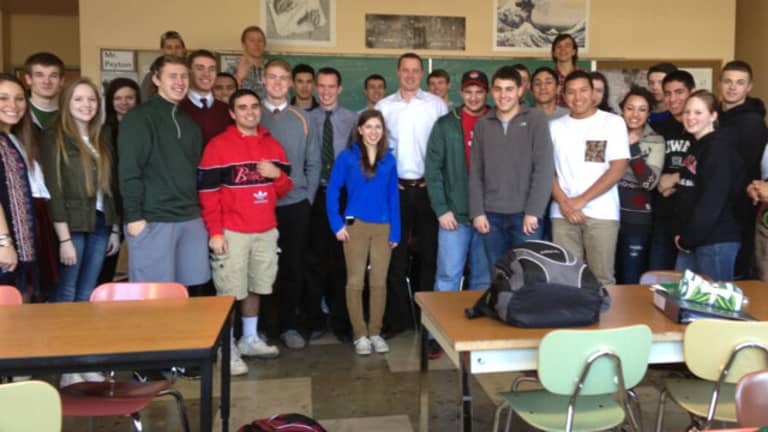
Paulson (center) says he was not academcially inclined as a teenager, but he knew right away he didn't want to follow in his father's footsteps to the finance world.
- Photo courtesy of Merritt Paulson
Paulson says he wasn’t necessarily a troublemaker as a teenager, but he certainly wasn’t academically inclined. He drank periodically but shied away from drugs, chased girls, got in occasional scrapes with other boys and, when things got boring in the suburbs, stood on the roof of a friend’s jeep while they were cruising down the street.
“I don’t know where I’d fit on the Heathers spectrum,” he says, invoking another classic '80s-era adolescent film. “I don’t think I was in any box. I was a wise ass.”
By the time Paulson landed at tiny Hamilton College in upstate New York and began majoring in English, his father, Henry Paulson, has risen to co-head of Investment Banking for Goldman. By the time the son graduated and started a gradual path to Harvard Business School, the father was the firm’s chief executive and one of the most powerful financial figures in the country.
But, as is always the case with fathers and sons, there were some stark differences between the two. Henry Paulson was an All-American honorable mention as an offensive lineman at Dartmouth, while Merritt hit puberty late, probably should have been held back a year and was a middling athlete who ran cross country and played tennis, rising as high as the No. 2 singles player for his high school team.
And perhaps more importantly, even as his dad rose to extreme heights in the financial world – his net worth has been estimated at $700 million – Paulson was never truly interested in the same career path.
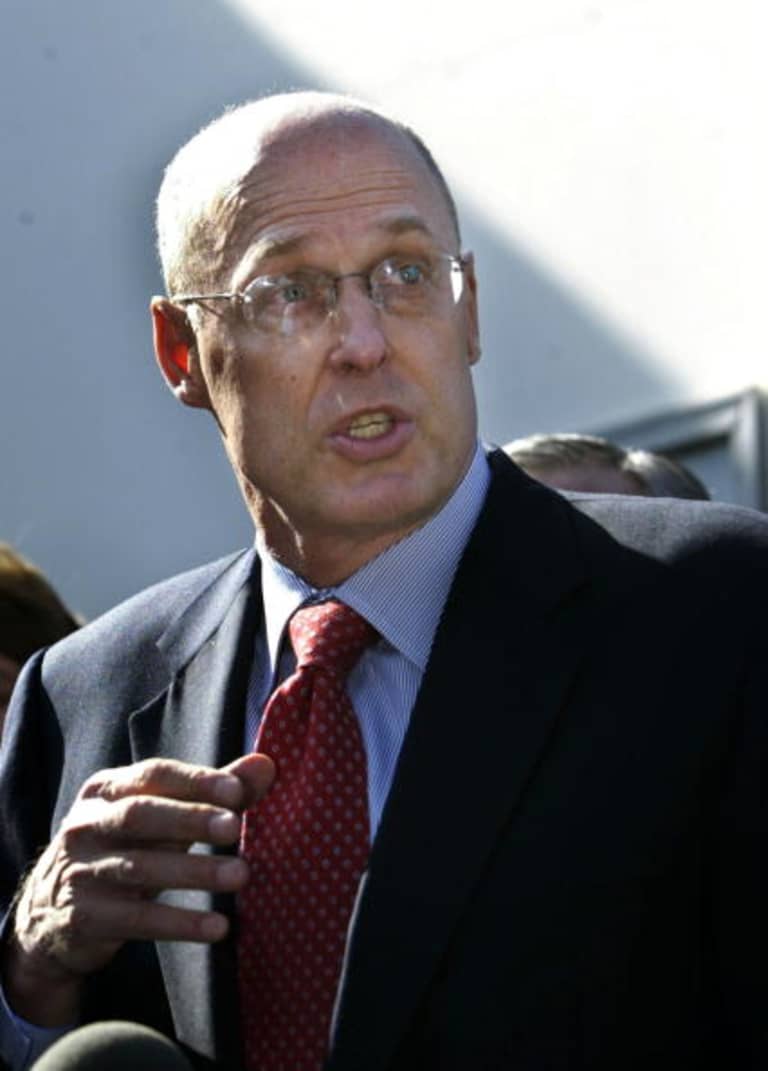
Henry Paulson was named the CEO of investment giant Goldman Sachs in 1994. He told his son Merritt there he would offer a "one-bullet deal" to help finance the purchase of a sports franchise.
- Getty Images
“Goldman Sachs had a pretty successful history of nepotism, where a lot of sons and daughters of people went there and did well,” Paulson says. “But you couldn’t have paid me a million dollars to do it, because I didn’t want to be living in somebody’s shadow.”
Instead, Paulson discovered quickly that he wanted to be part of the sports and entertainment business, and he had a knack for marketing. After earning his MBA from Harvard, he landed a job in New York as part of the team that launched HBO on Demand, and then he became an executive at NBA Entertainment, where he helped launch and develop NBATV and NBA League Pass.
As Paulson’s business acumen grew he was also well aware he had a golden ticket in the form of his father’s fortune and faith, and that it would lead to something larger in the sports world. He says he was offered a “one-bullet deal,” where his father would financially back one large investment in a professional sports franchise, and that eventually led to a foray into Major League Soccer in 2005.
That’s when Paulson and his father first entertained the idea of purchasing an MLS franchise – the San Jose Earthquakes, who eventually left the Bay Area for Houston ahead of the 2006 season – but the financial commitment required to build a soccer-specific stadium in San Jose was too steep.
Instead Paulson turned his attention to Portland, where the Timbers had endured a checkered past with ownership. Despite a rich history dating back to the North American Soccer League’s glory days in the 1970s, the franchise had drifted in and out of existence over two decades, and by 2004 was actually part of a package deal with the Portland Beavers, and owned by baseball’s Pacific Coast League.
California developer and restaurant owner Abe Alizadeh purchased both teams in March 2005 but was largely focused on the possibility of bringing Major League Baseball to Portland, leaving the future of the Timbers as an afterthought.
And while critics initially pointed to the name of Paulson’s ownership group, Shortstop LLC, as an all-too-easy indication he too had purchased the teams in 2007 with an eye on turning the Beavers into a big-league expansion franchise, he insists he always had eyes on turning the Timbers into an MLS team.
“People’s argument was that baseball was the biggest asset of the deal and I named my company Shortstop LLC. Well, so what?” he says. “We named the company that for a Triple-A baseball team. We re-named it [to Peregrine Sports LLC] when we went to MLS. It doesn’t mean I’m a baseball guy.”
The battles were only just beginning. His initial intention was to renovate PGE Park into a soccer-specific stadium for the Timbers to one day join MLS, and build a new stadium in Portland for the Beavers.
But the proposed $31 million renovation of PGE Park – and another $48 million proposed for a new baseball stadium – came as the nation slipped into the deepest financial recession in decades. A number of city leaders balked at the idea of spending public dollars to help the East Coast son of a multimillionaire – by that time Henry Paulson had become the face of the crisis as the US Treasury Secretary under President George W. Bush – build his empire in Portland.
WATCH: Paulson discusses the soccer support in Portland and the Timbers' rivlary with the Seattle Sounders in 2011.
Paulson endured and quickly became a pinch-hit politician during the process, and that’s when he realized he needed to become a public spokesman for the pursuit of big-time soccer in Portland. So he debated his critics on television, radio and in person. He attended neighborhood meetings and made fast friends with influential city council members and Portland Mayor Sam Adams.
Still, nothing prepared him for the backlash that came during a neighborhood meeting in 2009, when residents “basically threw [expletive] at me,” he says, and critics held up a sign that read “No subsidized ballpark for the rich boy toy!”
Said Paulson: “I found out I was capable of patience. Extreme patience. And I have forever been an impatient person. Being patient has never in my life been one of my strengths.”
The plans for a new baseball stadium in Portland died and Paulson eventually sold the Beavers, but soccer survived. In March 2009, MLS announced the Timbers would join as an expansion franchise in 2011, and four months later, the Portland city council approved the $31 million renovation of PGE Park.
He didn’t get the deal done without some help – the Timbers Army supporters group played their part too, and some members are so well connected in local politics that in 2010 TheOregonian named the Army the fifth-most influential figure in Portland sports, two spots ahead of Paulson – but it was Paulson’s group that paid the $40 million franchise fee to join MLS, and Paulson who took the very public hits.
“He is so different from the people who have lifted this team from the grassroots,” said longtime Timbers Army member Shawn Levy. “His contribution is inestimable. The financials, the vision, the perseverance. And oh, he took so much crap.”
Levy, a longtime film critic for TheOregonian, finished a biography on actor Paul Newman the same year, and knew that both Newman and Henry Paulson had been prominent conservationists and members of the National Audubon Society. So impressed was he with Merritt Paulson’s determination to get the stadium deal done for his beloved Timbers, he sent Henry Paulson an autographed copy of the Newman biography with a special inscription.
“Dear Hank,” Levy wrote. “On behalf of the Timbers Army, thank you for raising a mensch.”
---
Paulson typically shows up to his office at JELD-WEN Field on weekdays at eight in the morning and leaves around seven in the evening, sometimes later. Game days are longer, because there’s typically any number of activities or appearances during the day, and then he makes sure to tape the game while he’s at the stadium at night so he can watch again at home before he falls asleep.
When he’s on the road, he traditionally watches alone in a suite. In Portland, he watches games from an unflattering room at the end of press box row, either by himself or with Timbers general manager Gavin Wilkinson, his right-hand man since he took over the team.
The tour is a short one.
“Couple of marks on the wall there,” he says. “Those games did not go well.”
It’s clear almost immediately after beginning a conversation with Paulson that he operates on a low to mid-level of anxiety, but it appears to work for him. As both president and owner of the club, he’s stretched thin during the course of an average work day, at times sitting in on meetings with city officials, the team’s marketing department or even the staff that mans the club’s website, so he can have a handle on what kinds of stories about the club are published online. His only rule? He won’t work with player’s agents on contracts, because he doesn’t trust them.
His office – which offers a direct view to the JELD-WEN playing field, where the Timbers sometimes practice – is decorated simply, with photos of his wife and two children, a commemorative soccer ball from the club’s inaugural MLS season encased in glass, a refrigerated wine cooler, a framed preliminary concept drawing of the renovated PGE Park, and a computer featured prominently on his desk, with an internet browser opened to a soccer news web site.
For a week last month, a table was cluttered with office printouts and a hardback copy of Lone Survivor, a 2009 non-fiction recount of a reconnaissance mission in Afghanistan that led to the largest loss of life in American Navy SEAL history. But, Paulson insists, he doesn’t have much time to read anymore. Too busy. He’s a huge fan of shows like Breaking Bad, The Wire and Justified, but gone are his undergraduate days when he read the classics. Now, it’s obvious after even a short one-on-one conversation or watching his Twitter feed, he spends his reading time following who’s talking about the Timbers, and what they’re saying.
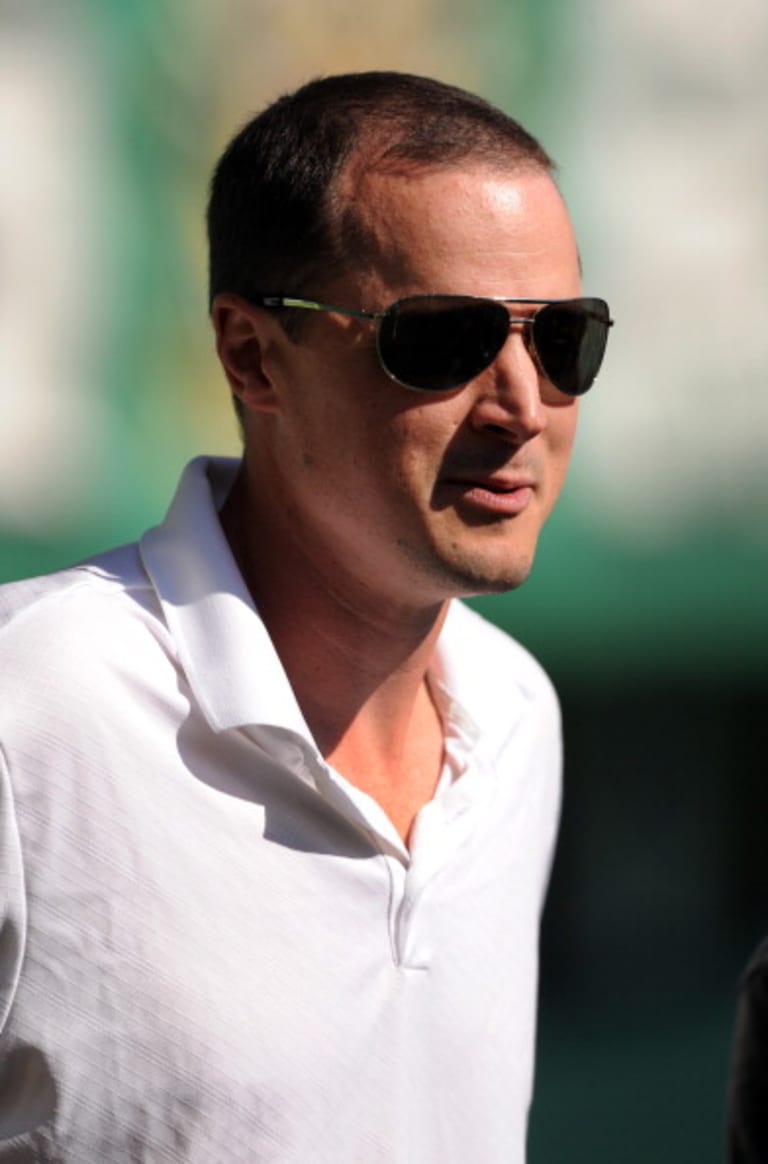
Paulson during the Timbers' match against the Seattle Sounders in September 2012.
- Getty Images
“This is the age of internet muscles, man,” he says. “People get behind the computer and they’ll say anything.”
That applies to Paulson, too, who in the past three years has become a Twitter sensation for his candid and sometimes impulsive reactions to games, player signings and all things Timbers. It’s colored his reputation so much since 2011 that he’s promised to step back from social media this year and think twice before tweets like the one last October that drew a record $25,000 fine from MLS Commissioner Don Garber for "inappropriate conduct directed at officials and through use of social media."
That incident lumped Paulson into a category he wants no part of: any type of fraternity featuring Mark Cuban. The Dallas Mavericks owner has had similar entanglements with and drawn comparable fines from NBA Commissioner David Stern, and Paulson has grown tired of the comparisons. Any similarities, he insists, are superficial at best.
Instead, the two owners Paulson admires are the late Jerry Buss and the late George Steinbrenner. Buss was the famous architect of the Los Angeles Lakers’ run of 10 NBA titles from 1979-2010, and Steinbrenner was the infamous face of the New York Yankees who won six World Series titles and fired 15 different managers in his 34 years on the job.
In fact, Paulson knew Steinbrenner before he passed away in 2010, thanks to Henry Paulson’s relationship with the Yankees after Goldman Sachs helped broker a television deal with the YES Network. Merritt would periodically sit with Steinbrenner during games and the Yankees owner grew to think of him as a good-luck charm.
“Maybe George was more outspoken than I might be and he had a heavy hand, but you can’t argue with his passion and his success,” Paulson says. “Both Buss and Steinbrenner were in it full time, they both treated it like a community asset and thought of the fans first, and both of them won. And both of them weren’t shy about doing what was right for the team and saying what was right for their team.”
But of course, neither had Twitter to help sully their public image the way that it has done periodically for Paulson.
“It’s become part of my brand, which is actually a net-positive,” says Paulson, who adds he has a good relationship with Garber based on mutual respect. “But I’ve had to step back from it a little and reevaluate. My goal this season – you won’t see me do a lot of tweeting. I’m not going back and forth with fans anymore.”
Despite that, nearly 9,000 followers can still watch him trade barbs with Lalas (who since 2011 has become a friend and willing Internet nemesis), preach patience from Timbers skeptics, harp on borderline calls from officials and scratch his favorite itch: a rivalry with the Seattle Sounders that could be the single biggest driving force that gets him up in the morning.
The Sounders have made waves like no other team in league history since their debut in 2009, smashing attendance records, spending freely on proven European and South American players and, most irksome to Paulson, winning a whole bunch of soccer games.
Paulson has embraced the rivalry so heartily that many of even his staunchest supporters say he’s obsessively driven by jealousy of the Sounders’ success, which led him to guarantee before the 2012 season that the Timbers would make the playoffs, just like the Sounders.
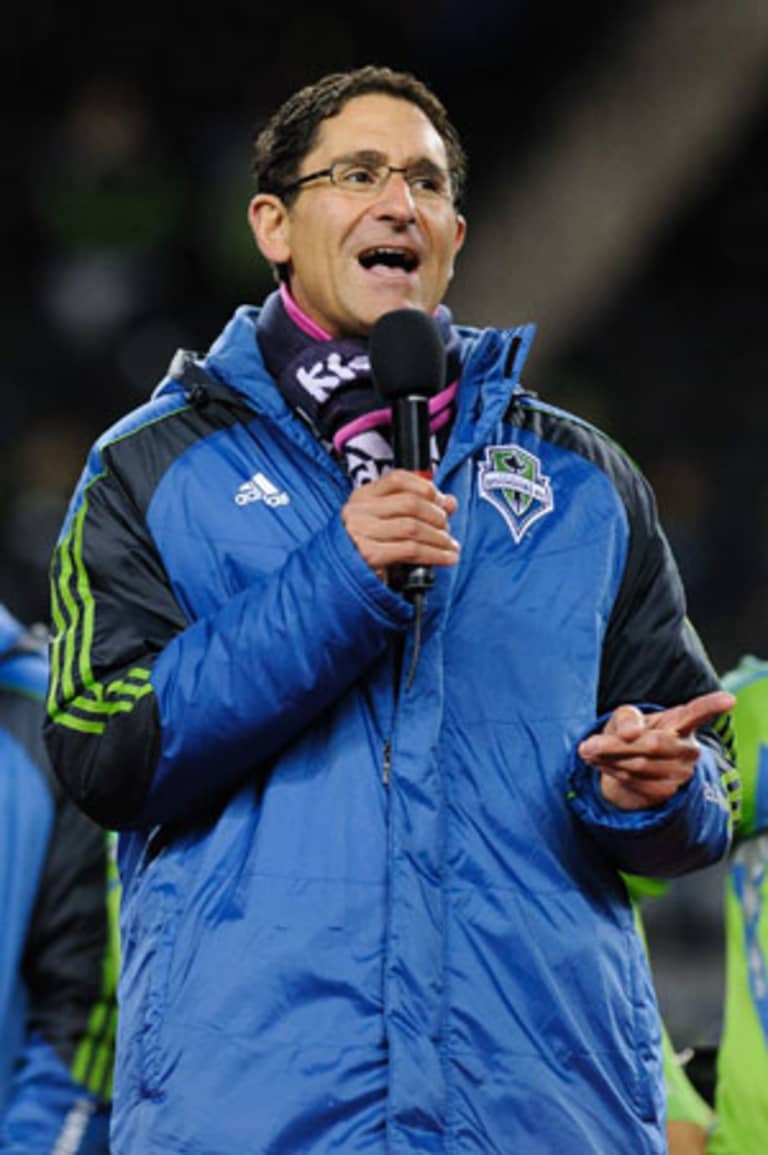
Seattle Sounders part owner and general manager Adrian Hanauer, who first befriended Paulson during the teams' A-League days.
- Getty Images
They didn’t, but the Sounders definitely did. In fact, Seattle reached the playoffs each of their first four years in the league, won three US Open Cups, currently draw the largest local television ratings in MLS (the Timbers are second) and never endured the curse of the fledgling expansion franchise like the Timbers have over the past two seasons.
But Paulson, who says his closest friend among the other franchise owners is actually Sounders part-owner and general manager Adrian Hanauer (right), bristles at the idea that Seattle’s success has dwarfed that of some of the other teams in the league or that he’s in awe of their on-field triumphs.
“They’ve had success off the field, OK? They’ve won some US Open Cups. And they’re talked about as an uber-successful team?” he says. “What else have they won? In a short amount of time they’ve been a winning team. They won their first playoff series last year.”
He also quickly cites the fact that Sounders came into MLS alone in 2009 and reaped the benefits of the MLS Expansion Draft, while the Timbers shared the spoils when they came in at the same time as the Vancouver Whitecaps two years later.
And unlike the Timbers, the Sounders spent money freely on aging, established veterans – goalkeeper Kasey Keller and midfielder Freddie Ljungberg were international stars who featured in Seattle during their expansion year in 2009 – while the Timbers have tried to mold themselves after Real Salt Lake’s 2007 revival, built on young players buying into a cohesive system without established star players.
And then Paulson pauses, and spends exactly nine words addressing the elephant in the room.
“And they got the coach right,” he says, “which I didn’t.”
Part two of this series will appear on MLSsoccer.com on Monday, April 1.

